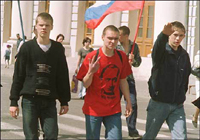Russian nationalists to march in cities on 4th of November

Russian nationalist have mixed up nationalism and patriotism. They plan to march in Moscow and other cities Sunday to celebrate a new holiday created by the Kremlin to promote patriotism.
The marches, with a pro-white and anti-immigrant bent, are a reflection of rising xenophobia in Russia. Rights activists say they are a natural outgrowth of the Kremlin's attempts to rebuild a strong Russian state.
In Soviet times, the 1917 Bolshevik rise to power was celebrated Nov. 7 with parades and rallies. Boris Yeltsin, the first post-Soviet president, renamed the holiday the Day of Accord and Reconciliation. But Communists continued to celebrate the old holiday and it acquired an anti-government tone.
So two years ago, President Vladimir Putin gave the holiday a new date, Nov. 4, and a new name, National Unity Day. But the new holiday has been seized upon by extreme nationalists, who have organized what has come to be called the Russian March.
Sunday's march is being staged by the Movement Against Illegal Migration, which advocates the deportation of nonwhite migrants, and the Slavic Union, another white supremacist group.
"Of course, we are not using the holiday the way the administration wanted it to be used," said Alexander Belov, the leader of the Movement Against Illegal Migration, or DNPI. His last name, based on the Russian word for "white," is a nom de guerre.
The Kremlin has tried to give the holiday historical significance by tying it to the 1612 expulsion of Polish and Cossack troops who had briefly seized Moscow at a time of political disarray.
Months later, the 16-year-old Mikhail Romanov was chosen as Russia's new czar; his dynasty ruled for 300 years.
For the Kremlin, the historical parallel was clear. After the troubled years following the 1991 Soviet collapse, Putin has overseen a resurgent Russia that has challenged the West to reclaim its standing as a major international player.
A spokesman for Putin tried to play down the anti-Western character of the holiday.
"It should not be connected to the Poles," Dmitry Peskov said. "It's a day of national accord, national unity, which is very important for Russia today."
But anti-immigrant nationalists are using it for their own agenda.
"It's not the Poles we will evict from Russia," Slavic Union leader Dmitry Demushkin said at a news conference Thursday, as organizers of the march laughed. "The Russian March goes on year round."
In the first Russian March in 2005, thousands marched through Moscow, some shouting "Heil Hitler." The march caused an uproar; the following year police broke up the demonstrations.
This year, Moscow authorities have approved a Russian March for up to 7,000 people along an embankment of the Moscow River, away from the city center. Organizers also plan marches in more than 20 other cities.
Nationalist and neo-Nazi groups have instructed their activists to cooperate with police and avoid fights. Slavic Union supporters have agreed not to unfurl their banners, consisting of four squares superimposed to resemble the Nazi swastika, Belov said.
"This is a celebration of the Russian people. Nobody will yell 'Heil, Hitler,"' said Yevgeny Valyayev, spokesman for the Russian March.
Lev Ponomaryov, a rights activist, said authorities fail to understand that the demonstrators' slogans are merely cruder versions of what is said by Russia's "anti-liberal and anti-immigrant" leaders.
"In the end, shortsighted Kremlin ideologists and strategists have given the extremists a wonderful holiday," Ponomaryov wrote in an opinion piece Friday in The Moscow Times.
The country has seen a rise in hate crimes, with more than 50 people killed and more than 400 injured in ethnically motivated attacks this year, according to the Sova rights center.
Several pro-Kremlin youth groups and the youth group of the liberal Yabloko party plan to hold counter rallies Sunday.
Only 23 percent of Russians know the name of the Nov. 4 holiday, according to a poll released Friday by the Levada Center. Of the 1,600 people polled nationwide, only 4 percent knew that the holiday commemorates the liberation of Moscow from the Poles in 1612. The poll has a margin of error of 3 percentage points.
Meanwhile, the Communist Party, which still has a loyal following of 10-15 percent of the population, will hold rallies throughout Russia on Wednesday, the 90th anniversary of the Bolshevik Revolution.
Subscribe to Pravda.Ru Telegram channel, Facebook, RSS!


